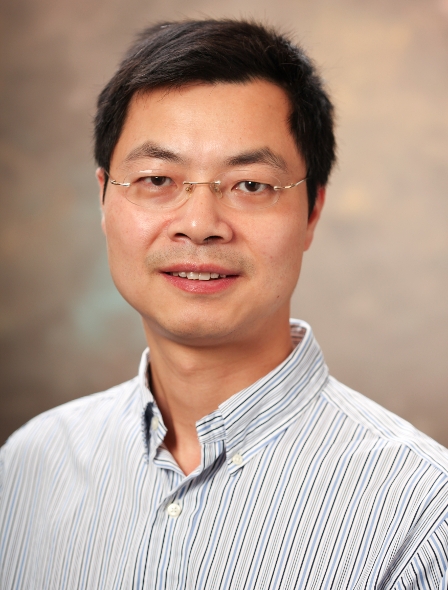
Bo Chen, PhD
About Me
Dr. Bo Chen is a tenured Professor in the Departments of Ophthalmology and Neuroscience at the Icahn School of Medicine at Mount Sinai, and an endowed professorship of The Harold W. McGraw, Jr. Family Foundation Professor in Neuroregeneration. Dr. Chen received his PhD in Pharmacology at the University of Miami School of Medicine, and later pursued postdoctoral training in the Department of Genetics at Harvard University. He was previously an Assistant and Associate professor in the Departments of Ophthalmology and Neuroscience at Yale University School of Medicine. Dr. Chen received the Karl Kirchgessner Foundation Award for Retinal Research and was a Pew Scholar in the Biomedical Sciences from 2013-2017. He is a reviewer for numerous publications including, but not limited, to Science, Neuron, eLife, PNAS, Cell Reports, Science Advances, and Journal of Neuroscience.
Dr. Bo Chen’s research focuses on mechanistic and therapeutic studies of retinal degenerative diseases caused by loss of photoreceptors or retinal ganglion cells, such as age-related macular degeneration, retinitis pigmentosa, and glaucoma. To study these conditions, his laboratory pursues two main strategies: neuroprotective strategy to save existing retinal neurons and neural regenerative strategy to produce new retinal neurons.
Selected publications:
1. Xie Y, Zhou J, Chen B†. “Critical examination of Ptbp1-mediated glia-to-neuron conversion in the mouse retina ”.
Cell Reports. 2022 Jun 14;39(11):110960. doi: 10.1016/j.celrep.2022.110960.
2. Guo XZ, Zhou J, Starr C, Mohns EJ, Li YD, Chen E, Yoon YJ, Kellner C, Tanaka K, Wang HB, Liu W, Pasquale LR, Demb JB, Crair MC, Chen B†. “Preservation of vision after CaMKII-mediated protection of retinal ganglion cells”.
Cell. 2021 Jul 14;S0092-8674(21)00799-6. doi: 10.1016/j.cell.2021.06.031.
Research Highlights: “Retinal protection”.
Nature Reviews Neuroscience. 2021; https://doi.org/10.1038/s41583-021-00512-1.
3. Yao K, Qiu S, Wang Y, Park S, Mohns EJ, Mehta B, Liu X, Chang B, Zenisek D, Crair MC, Demb JB, Chen B†. “Restoration of vision after de novo genesis of rod photoreceptors in mammalian retinas.”
Nature. 2018 Aug;560(7719):484-488.
Research Highlights: “Restoring sight with native cell reprogramming”.
Nature Medicine 24, 1303 (2018). https://doi.org/10.1038/s41591-018-0192-6.
4. Yao K, Qiu S, Tian L, Snider WD, Flannery JG, Schaffer DV, Chen B†. “Wnt regulates proliferation and neurogenic potential of Müller glial cells through a Lin28/let-7 miRNA-dependent pathway in adult mammalian retina”.
Cell Reports. 2016 Sep 27;17(1):165-78.
5. Guo XZ, Snider WD, Chen B†. “GSK3β regulates AKT-induced CNS axon regeneration through an eIF2Bε-dependent, mTOR-independent signaling pathway”.
eLife. 2016;5:e11903.
Research Highlights: “Enzymes help to regrow nerves”.
Nature. 2016 April 7:v532.
6. Guo XZ, Wang SB, Xu HP, Ribic A, Mohns EJ, Zhou Y, Zhu XJ, Biederer T, Crair MC, Chen B†. “A Short N-terminal Domain of HDAC4 Preserves Photoreceptors and Restores Visual Function in Retinitis Pigmentosa”.
Nature Communications. 2015 Aug 14;6:8005. doi:10.1038/ncomms9005.
7. Chen B and Cepko CL. “HDAC4 regulates neuronal survival in normal and diseased retinas”.
Science. 2009 Jan 9;323(5911):256-9. PMID 19131628
Language
English
Research Topics
Axonal Growth and Degeneration, Neuro-degeneration/protection, Neuronal Regeneration, Neuroscience
Industry Relationships
Physicians and scientists on the faculty of the Icahn School of Medicine at Mount Sinai often interact with pharmaceutical, device, biotechnology companies, and other outside entities to improve patient care, develop new therapies and achieve scientific breakthroughs. In order to promote an ethical and transparent environment for conducting research, providing clinical care and teaching, Mount Sinai requires that salaried faculty inform the School of their outside financial relationships.
Dr. Chen has not yet completed reporting of Industry relationships.
Mount Sinai’s faculty policies relating to faculty collaboration with industry are posted on our website. Patients may wish to ask their physician about the activities they perform for companies.